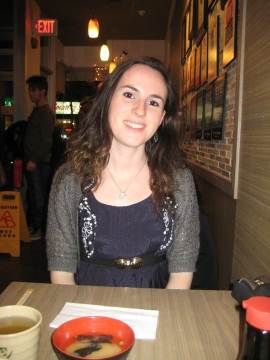 Anna Stainton enrolled last year in the M.A. program in German Language, Culture, and Theory at the University of Toronto and quickly found herself immersed in an environment rich in interdisciplinary possibilities, including coursework in the Cinema Studies Institute. This drew her to continue her studies this Fall in the Ph.D. program, while also appointed a research fellow with the Jackman Humanities Institute. Anna’s interest in German cinema began early in her undergraduate studies at King’s College, London. She enrolled in a survey course called “One Hundred Years of German Film” with a professor whose lectures were so captivating she proceeded to enroll in all his lectures parallel to her literary coursework. Since the lectures on German cinema were given in the context of a German Department rather than a Cinema Department, the emphasis was on an analysis of the narrative and socio-historical content. Lectures that Anna attended at the Department of Cinema Studies at the University of Toronto
opened a new approach to analyzing film, with specific attention to how the possibilities and constraints of the medium itself shape discourse.
Anna Stainton enrolled last year in the M.A. program in German Language, Culture, and Theory at the University of Toronto and quickly found herself immersed in an environment rich in interdisciplinary possibilities, including coursework in the Cinema Studies Institute. This drew her to continue her studies this Fall in the Ph.D. program, while also appointed a research fellow with the Jackman Humanities Institute. Anna’s interest in German cinema began early in her undergraduate studies at King’s College, London. She enrolled in a survey course called “One Hundred Years of German Film” with a professor whose lectures were so captivating she proceeded to enroll in all his lectures parallel to her literary coursework. Since the lectures on German cinema were given in the context of a German Department rather than a Cinema Department, the emphasis was on an analysis of the narrative and socio-historical content. Lectures that Anna attended at the Department of Cinema Studies at the University of Toronto
opened a new approach to analyzing film, with specific attention to how the possibilities and constraints of the medium itself shape discourse.
For her PhD thesis, Anna plans to focus on the construction of new national heroes in East German films of the early postwar period. Anna expects to use films as historical indicators of cultural shifts triggered by a vacuum of leadership in the aftermath of the war. Although this search for new heroic models has been explored in German literature, it remains neglected in the scholarship on German films. Overall, East German literature inclined towards the portrayal of socialist heroes and privileged true accounts from the war era. While some narratives were based on historical documentation and personal journals, others were forged specifically with the specific intent of conjuring new national heroes embedded in everyday life, and, more locally, within one’s own family tree. Such stories contributed towards the overall trend in which East Germany distanced itself from the West, attributing the totality of the Nazi regime to the West and claiming a purely socialist legacy for the East. Anna will be
searching for similar patterns in East German films.
Anna is honing her writing and analytical skills by contributing an article to an anthology on autobiographical filmmaking edited by Professor Angelica Fenner in collaboration with a colleague, Robin Curtis, in Berlin. In her article, Anna explores the documentary Winter Adé (Helke Misselwitz, 1989), which utilizes a narrative structure very much informed by gender identity. The film can be read as displaying a personal, autobiographical imprint even while oriented towards the documentary testimonials of a cross-section of women in East Germany reflecting on the personal and societal choices and constraints that have shaped their lives.
Anna strives to find a balance between her academic studies and more hands-on and social activities on campus. She enjoys heading up the German Drama Club, which engages undergraduates and graduate studies in a yearly performance, and also leads weekly screenings in the Media Commons of the main library on behalf of the German Film Club.
|